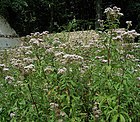Note: This is a project under development. The articles on this wiki are just being initiated and broadly incomplete. You can Help creating new pages.
Difference between revisions of "Eupatorium cannabinum"
| (3 intermediate revisions by the same user not shown) | |||
| Line 1: | Line 1: | ||
[[File:Eupatorium cannabinum 08 ies.jpg|thumb|right]] | [[File:Eupatorium cannabinum 08 ies.jpg|thumb|right]] | ||
| + | |||
| + | '''Eupatorium cannabinum''' is a perenial. It grows upto to 1.5 m tall. It is hardy to zone (UK) and is not frost tender. It is in flower from July to September and the seeds ripen from August to October. | ||
==Uses== | ==Uses== | ||
| − | {{Uses|}}, {{Uses|}}, {{Uses|}}, {{Uses| | + | {{Uses|Vomiting}}, {{Uses|Influenza}}, {{Uses|Cancer}}, {{Uses|Liver problems}}.<ref name="Uses"/> |
| − | + | ||
==Parts Used== | ==Parts Used== | ||
| − | {{Parts Used| | + | {{Parts Used|}}. |
==Chemical Composition== | ==Chemical Composition== | ||
| Line 47: | Line 49: | ||
==Mode of Propagation== | ==Mode of Propagation== | ||
| − | {{Propagation|}} | + | {{Propagation|Seeds}} |
==How to plant/cultivate== | ==How to plant/cultivate== | ||
| − | <ref name="How to plant/cultivate"/> | + | An easily grown plant[233], it succeeds in ordinary garden soil in sun or part shade. Prefers a rich moist soil.<ref name="How to plant/cultivate"/> |
==Commonly seen growing in areas== | ==Commonly seen growing in areas== | ||
| − | {{Commonly seen|}}, {{Commonly seen|}}, {{Commonly seen| | + | {{Commonly seen|Streams}}, {{Commonly seen|Low damp sites}}, {{Commonly seen|On woods}}. |
==Photo Gallery== | ==Photo Gallery== | ||
| Line 66: | Line 68: | ||
<references> | <references> | ||
| − | <ref name="chemical composition">[ | + | <ref name="chemical composition">[Chemistry]</ref> |
| − | <ref name="Leaf">[ | + | <ref name="Leaf">[Morphology]</ref> |
| − | <ref name="How to plant/cultivate">[ | + | <ref name="How to plant/cultivate">[http://temperate.theferns.info/plant/Eupatorium+cannabinum Cultivation]</ref> |
<ref name="Uses">Indian Medicinal Plants by C.P.Khare</ref> | <ref name="Uses">Indian Medicinal Plants by C.P.Khare</ref> | ||
</references> | </references> | ||
==External Links== | ==External Links== | ||
| − | * [ ] | + | * [https://www.rhs.org.uk/Plants/7024/Eupatorium-cannabinum/Details Eupatorium cannabinum on rhs.org.uk] |
| − | * [ ] | + | * [https://wildseed.co.uk/species/view/49 Eupatorium cannabinum on wildseed.co.uk] |
| − | + | ||
[[Category:Herbs]] | [[Category:Herbs]] | ||
[[Category:Pages without herbs images]] | [[Category:Pages without herbs images]] | ||
Latest revision as of 16:33, 20 October 2020
Eupatorium cannabinum is a perenial. It grows upto to 1.5 m tall. It is hardy to zone (UK) and is not frost tender. It is in flower from July to September and the seeds ripen from August to October.
Contents
- 1 Uses
- 2 Parts Used
- 3 Chemical Composition
- 4 Common names
- 5 Properties
- 6 Habit
- 7 Identification
- 8 List of Ayurvedic medicine in which the herb is used
- 9 Where to get the saplings
- 10 Mode of Propagation
- 11 How to plant/cultivate
- 12 Commonly seen growing in areas
- 13 Photo Gallery
- 14 References
- 15 External Links
Uses
Vomiting, Influenza, Cancer, Liver problems.[1]
Parts Used
[[:Category:Herbs with used in medicine|]].
Chemical Composition
Common names
| Language | Common name |
|---|---|
| Kannada | |
| Hindi | |
| Malayalam | |
| Tamil | |
| Telugu | |
| Marathi | |
| Gujarathi | |
| Punjabi | |
| Kashmiri | |
| Sanskrit | |
| English |
Properties
Reference: Dravya - Substance, Rasa - Taste, Guna - Qualities, Veerya - Potency, Vipaka - Post-digesion effect, Karma - Pharmacological activity, Prabhava - Therepeutics.
Dravya
Rasa
Guna
Veerya
Vipaka
Karma
Prabhava
Habit
[[:Category:Habit - |]]
Identification
Leaf
| Kind | Shape | Feature |
|---|---|---|
Flower
| Type | Size | Color and composition | Stamen | More information |
|---|---|---|---|---|
| {{{5}}} |
Fruit
| Type | Size | Mass | Appearance | Seeds | More information |
|---|---|---|---|---|---|
Other features
List of Ayurvedic medicine in which the herb is used
Where to get the saplings
Mode of Propagation
How to plant/cultivate
An easily grown plant[233], it succeeds in ordinary garden soil in sun or part shade. Prefers a rich moist soil.[4]
Commonly seen growing in areas
Streams, Low damp sites, On woods.
Photo Gallery
References
- ↑ Indian Medicinal Plants by C.P.Khare
- ↑ [Chemistry]
- ↑ [Morphology]
- ↑ Cultivation
External Links
- Ayurvedic Herbs known to be helpful to treat Vomiting
- Ayurvedic Herbs known to be helpful to treat Influenza
- Ayurvedic Herbs known to be helpful to treat Cancer
- Ayurvedic Herbs known to be helpful to treat Liver problems
- Herbs with used in medicine
- Habit -
- Index of Plants which can be propagated by Seeds
- Herbs that are commonly seen in the region of Streams
- Herbs that are commonly seen in the region of Low damp sites
- Herbs that are commonly seen in the region of On woods
- Herbs
- Pages without herbs images




